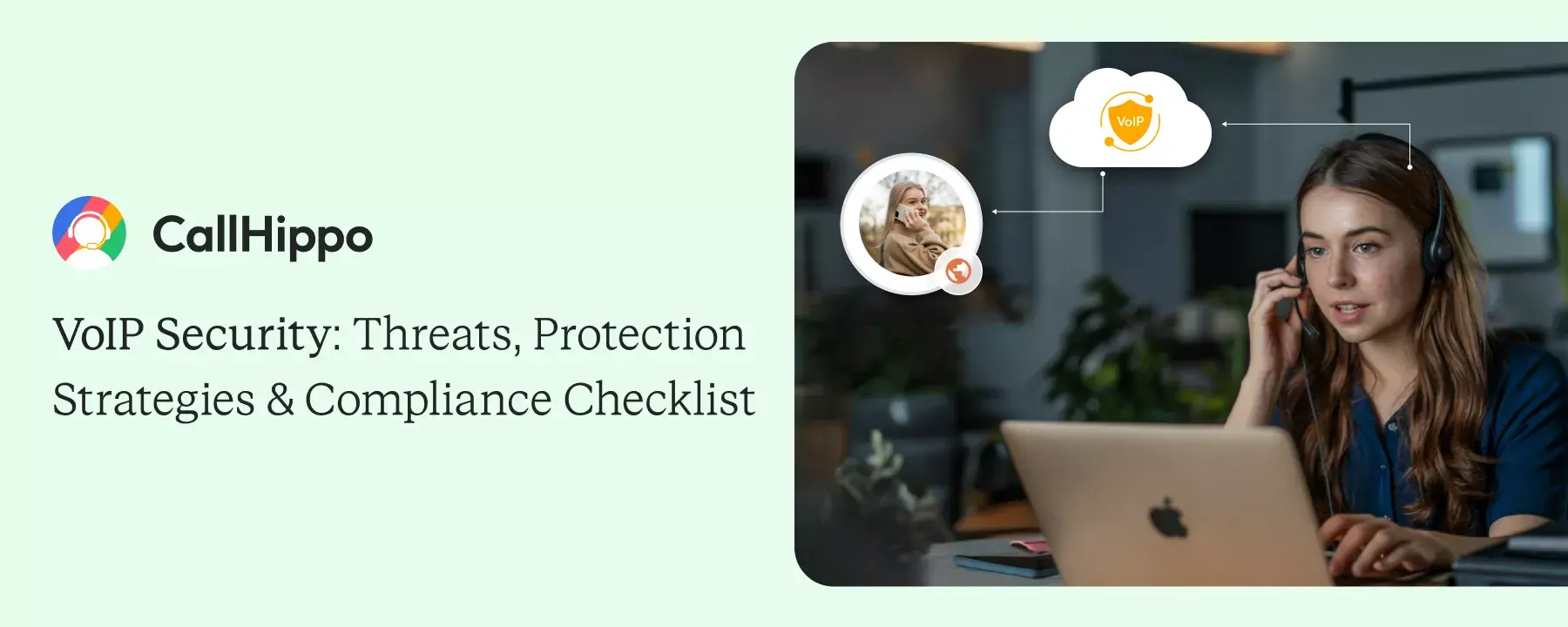VoIP systems have made communication faster and more efficient, but they also come with significant security risks.
A detailed review uncovered 221 known and disclosed vulnerabilities across VoIP and IMS systems, highlighting how exposed many networks are.
These issues often arise from weak configurations, outdated software, and unsecured communication protocols that can be exploited by attackers. For organizations relying on VoIP, this is a reminder that convenience should never come at the cost of security.
In this blog, we’ll explore key VoIP vulnerabilities, their real-world impact, and proven strategies to strengthen your communication systems against VoIP security threats.
5 VoIP Security Best Practices Checklist
To protect an organization’s data, a VoIP security program that includes access control, data encryption, security of the VoIP, and user awareness training is critical. Below are the essentials to develop VoIP security practices within all organizations.
Set up automated VoIP vulnerability scans every month to catch weak configurations or outdated firmware before attackers do. Use trusted tools like Nessus or OpenVAS and pair them with weekly patch management to maintain continuous security readiness.
1. Verification and Access Control
The most important layer of defense for any VoIP phone system is verification.
Change the default username and password, mandate complex (i.e., unique) credentials for all users and devices, and implement 2FA, or MFA with password verification to grant access to any VoIP application or device within your organization. Limit administrator privileges to those individuals who require them for business reasons and have records of login as suspect or unusual activity.
2.Encryption and Protocols
Confirm that the data communicated over VoIP networks is encrypted. Implement secure protocols such as SRTP (Secure Real-Time Transport Protocol) or TLS (Transport Layer Security) to protect both voice and signaling data from interception.
Be sure that you are only using a VoIP provider that incorporates end-to-end encryption; this is part of the provider’s privacy policy about securing your communications. You will also have to make sure that when it is needed, the encryption setting is configured correctly for VoIP’s internal as well as external calls. This will help you avoid being compromised by unauthorized individuals viewing sensitive data.
3. Network & Infrastructure
The VoIP ecosystem is built on a solid foundation of network connectivity. Routers should have firewall protection and intrusion detection systems that can block infected traffic from reaching VoIP servers and endpoints. You will also want to ensure all VoIP hardware, firmware, and all software (i.e. VPNs) remain up to date to ensure vulnerabilities are restricted and malware is limited.
4. Monitoring & Maintenance
Monitoring is key to recognizing anomalies as quickly as possible. This will help you recognize any kind of VoIP security risk presented to the hosted VoIP infrastructure.
You should also have tools to help you with activity logs on the VoIP international calls, connection attempts, and observations of using the network activity for malicious purposes. It would also help narrow down any reports/issues due to an increase in network traffic if someone were attempting to take advantage of the infrastructure you have established.
5. User Education
Even the most advanced and reliable technology will be ineffective without trained users. Training users on the basics of VoIP safety is essential, and staff should be aware of what to look for to keep their devices protected, whether it is recognizing phishing, securing their devices, and maintaining the confidentiality of the conversations.
Ask your users to reach out to your IT department if they notice anything unusual or suspicious. The goal of this training is to create a culture of security awareness that recognizes that users are part of your security solution, not just a weak link in your protection chain.
How to Select a Reputable VoIP Provider?
Choosing a VoIP provider shouldn’t be just about looking at cost and uptime metrics! It is about ensuring your company communications remain private, compliant, and protected from cyber risks. Many factors play a critical role in choosing a provider.
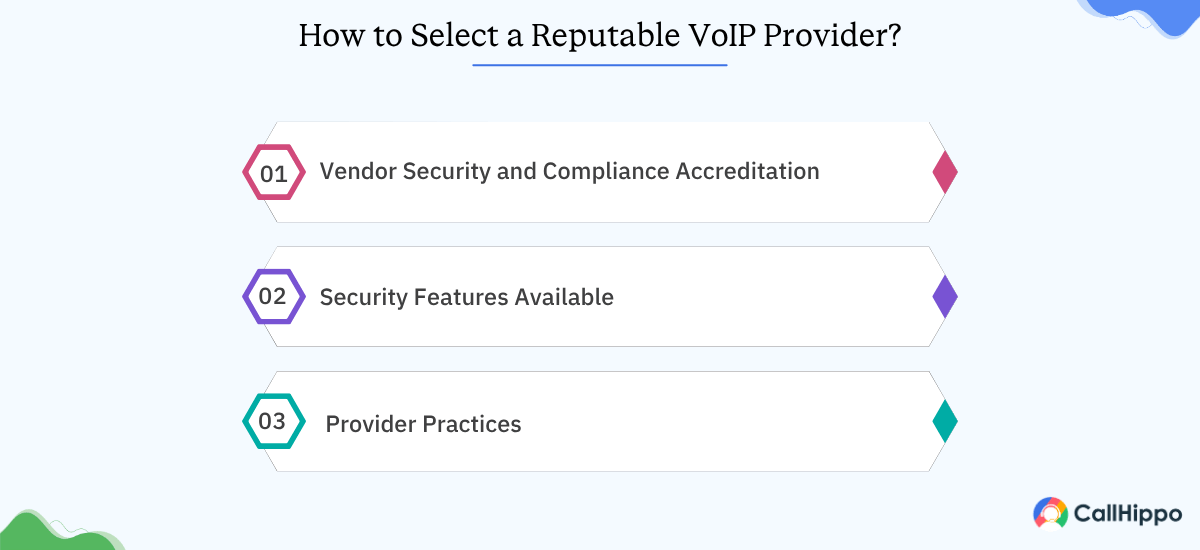
1. Vendor Security and Compliance Accreditation
When you are researching a VoIP vendor, it is important to verify that the vendor has some credentialing accreditation, such as ISO 27001, HIPAA, or even GDPR compliance, depending on your location. You should also ask to see the vendor’s SOC 2 Type II report, which indicates security practices and your data privacy and availability.
CallHippo, for instance, meets global compliance standards like GDPR and employs end-to-end encryption to ensure complete data protection for its users.
2. Security Features Available
You should always consider providers with embedded VoIP security features, including:
- End-to-end encryption (TLS/SRTP)
- Role-based admin controls
- Secure call recording and storage
- Automated intrusion detection
- 24/7 network monitoring
Request documents that explain the encryption type used, data centre certifications, and DDoS mitigation strategies.
3. Provider Practices
A provider’s internal security practices have a direct influence on your organization’s overall protection from digital threats. Before selecting a VoIP provider, investigate their transparency into operations and risk management practices.
Here are the practices to look for:
- Encryption Key Rotation: Periodically changing encryption keys to avoid data compromise.
- Transparency: Consistent reporting of threats, outages, and resolutions to clients.
- Third-party Vetting: Pre-qualification of third-party integration partners to ensure security compliance.
- Incident Response Protocols: Transparent, documented procedures for a timely response to incidents.
With CallHippo!
- 1Clear incident response protocols
- 2Transparent security reporting
- 3Third-party software vetting
- 4Enterprise-grade encryption
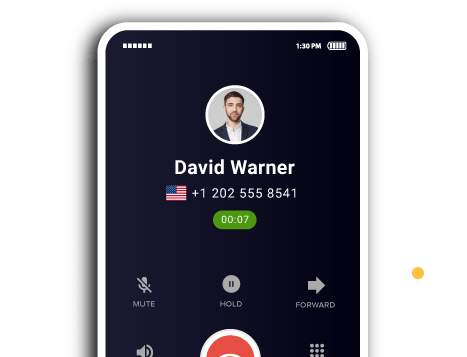
VoIP Security KPIs to Monitor
Watching VoIP security metrics will make your business phone system stable, compliant and resilient to relevant cyber adversities. Key Performance Indicators (KPIs) represent your security posture, facilitate early detection of anomalies, and help take a proactive response to developing security vulnerabilities.
Here are a few of them,
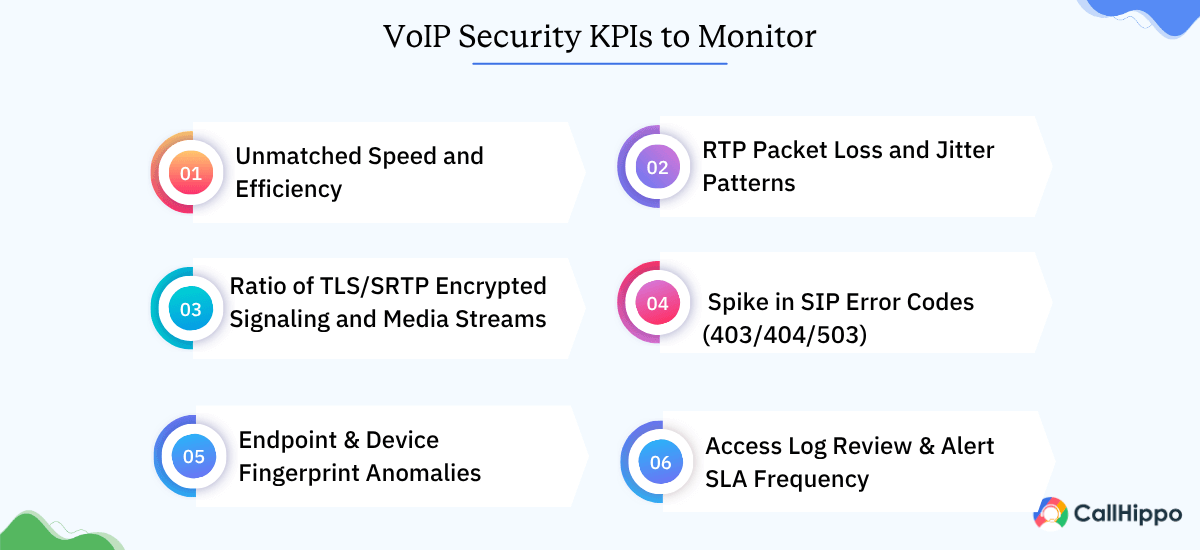
1. Unauthorized SIP Registration Attempts
This KPI will identify how frequently attackers attempt to register fake extensions or hijack your SIP credentials. A higher number of unauthorized SIP registration attempts suggests there are attackers attempting to brute-force (or credential stuffing) SIP credentials against your infrastructure.
Ongoing monitoring of this type will help identify if it is a spontaneous (cannot be defended) or a targeted attack (has more control measures like IP whitelisting or use of multifactor authentication).
2. RTP Packet Loss and Jitter Patterns
Loss of spikes in Real Time Protocol (RTP) packet loss or jitter could be a sign of network congestion. Moreover, consistent degradation of RTP Packet Loss could also indicate a long-term low-grade distributed denial of service attack.
Continued monitoring of these metrics can help you facilitate consistent call quality to VoIP users while identifying suspicious network conditions in real-time.
3. Ratio of TLS/SRTP Encrypted Signaling and Media Streams
Encryption compliance is demonstrative of how secure your VoIP environment is. Whenever possible, always verify if TLS is used for signaling and SRTP for media streams.
Utilization below 95% may reflect misconfigurations, legacy endpoints not supporting newer encryption standards, or hijacked endpoints.
4. Spike in SIP Error Codes (403/404/503)
Frequent SIP errors will often be indicative of authentication issues or unauthorized attempt at intrusion.
- Numerous occurrences of 403 or 404 errors may be indicative of brute-force login attempts, while spikes in 503 errors may signify an overload of your service. Sustainable alerts for sudden increases in errors will help to investigate and mitigate the error quickly.
5. Endpoint & Device Fingerprint Anomalies
The risk of data compromise increases once unauthorized or unrecognized devices gain access to your network. Device fingerprinting tools can determine a user flow or pattern based on endpoint behaviors and will flag devices if they recognize unusual endpoints or cloned credentials for authentication and identification. Continuous validation of endpoints will ensure only proper devices connect to your entire VoIP ecosystem.
6. Access Log Review & Alert SLA Frequency
Security teams should review access logs at least once each week and outline a clear timeline for responding to alerts. SLAs help define the expectation for how to respond to the notifications of security. Routine log review will also assist in locating anomalies in access or policy violations by monitoring repeated access alerts.
VoIP Security KPI Overview
| KPI | Purpose | Alert Threshold |
|---|---|---|
| SIP Registration Attempts | Detect unauthorized access | >3 attempts/hour |
| RTP Jitter | Monitor call interference | >30ms |
| Encryption Rate | Ensure compliance | <95% usage |
| SIP Errors | Identify attacks | >10 errors/minute |
VoIP Security for AI & Call Analytics Tools
As AI becomes widely used as part of modern communication platforms, new vulnerabilities will start to appear based on how voice data, transcripts, and call analytics are processed. AI-powered IVRs, sentiment analysis, and transcription systems often create sensitive customer information.
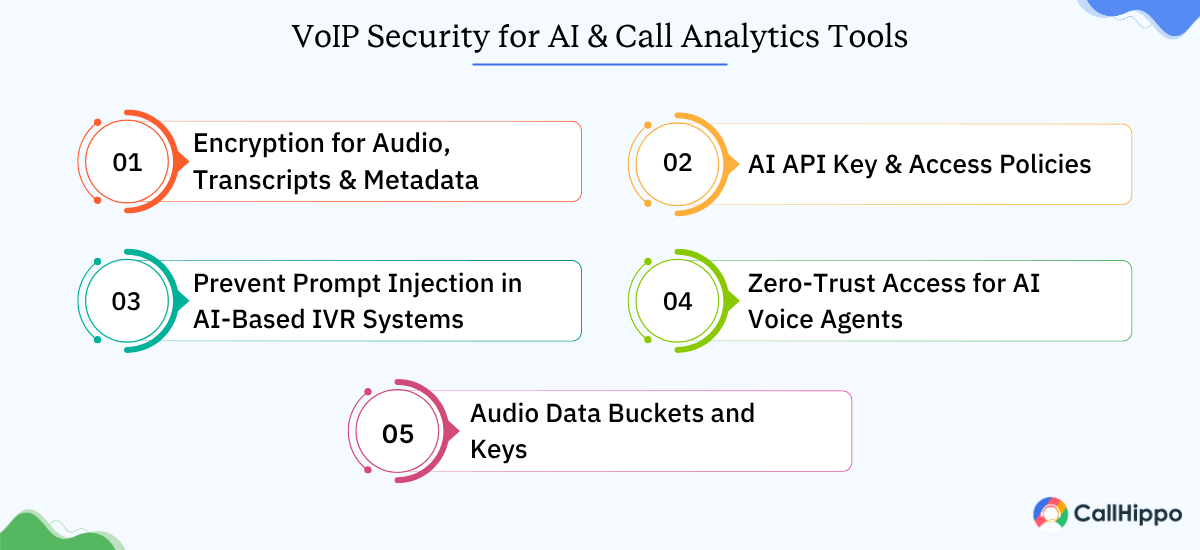
1. Encryption for Audio, Transcripts & Metadata
AI-driven call systems create multiple layers of sensitive information from raw audio to transcript data to metadata.
So, each layer should be encrypted in case one of the layers is compromised, so the other layers are safe. Utilize separate encryption keys for each layer of data and configure random key rotations every few months. This is easier if you utilize a key management system to assist in the encryption and rotation of your keys.
2. AI API Key & Access Policies
APIs that drive AI tools are often exploited by malicious actors. Limit access to API keys to verified IP addresses and/or authorized accounts only. Establish automated token rotations and/or use OAuth 2.0 for secure modern authentication for the AI. These security measures reduce the chances of malicious actors gaining access to your voice models or analytics engine.
3. Prevent Prompt Injection in AI-Based IVR Systems
Prompt injection attacks target AI programs by inserting harmful instructions into user input that drive the AI. To mitigate the effects of prompt injections, enforce input sanitization (like disallowing script tags) and restrict acceptable formats (like input sizes) and acceptable response formats (keep to your acceptable patterns). Routine audits of your AI behavior can ensure your AI doesn’t succumb to prompt injections.
4. Zero-Trust Access for AI Voice Agents
The Zero-Trust Architecture implies that no entity (user or system) should be assumed to be trustworthy. For every service-to-service or API communication, the voice agent must authenticate before trusting interactions or responding to the user’s request. This architecture minimizes insider threats and lateral movements by attackers within your comms framework.
5. Audio Data Buckets and Keys
Store your AI-generated audio and text data separately when possible, especially from other data you are saving. Try to store this data in a bucket that is isolated and/or encrypted.
You can use something like AWS KMS or Google Cloud KMS to securely manage and rotate encryption keys. Limit access to the storage bucket to only the accounts that need it, and restrict access to the bucket. This will limit the exposure of data to leaks or tampering.
Future of VoIP Security
VoIP security has now entered the age of business-grade security. With organizations moving their communications into the cloud, the security landscape is no longer about connectivity, but instead, about data integrity, compliance, and resilience from new cyber threats. Without a doubt, CallHippo is at the forefront of this evolution by improving its VoIP infrastructure with advanced encryption and GDPR-compliant data handling.
Key Trends for the Future:
- Move to enterprise-grade protection and compliance.
- AI and automation will drive faster threat detection and response.
- Unified cloud and on-premises security for hybrid variations.
- Increased focus on transparency and data residency from providers.
- Trust in providers like CallHippo for a secure HIPAA-compliant VoIP infrastructure.
Wrapping Up
VoIP streamlines communication for businesses, but communication is now more vulnerable than before. Security is now the bottom line of trust. One weak link, whether it’s a forgotten software security update or poor access control, will cost far more than just downtime; it will cost you trust.
The future of VoIP security rests on a layered, proactive, intelligent defense. Encryption, real-time monitoring, and AI threat detection are not extras; they are necessities. VoIP providers such as CallHippo work diligently to remove security concerns and provide secure, compliant, reliable communications that grow with your business.
Frequently Asked Questions
1. Which protocol protects the contents of a VoIP connection?
The secure real-time transport protocol encrypts the data between VoIP servers and the client network during transit. The data packets transmitted during the phone calls face a considerable security risk.
2. How can I protect my VoIP system from eavesdropping?
Building a secure VoIP network can prevent your VoIP system from eavesdropping. However, to create a secured VoIP network, you must ensure that all the data packets transferred during the calls are properly encrypted.
3. What is a DoS attack, and how can I prevent it?
DoS (Denial-of-service) attack is about making your machines inaccessible when needed by making them slow or taking them down. To prevent the DoS services, you would need multi-level protection strategies like Firewalls, anti-spam filters, security layers, load balancing, and so.

Subscribe to our newsletter & never miss our latest news and promotions.
